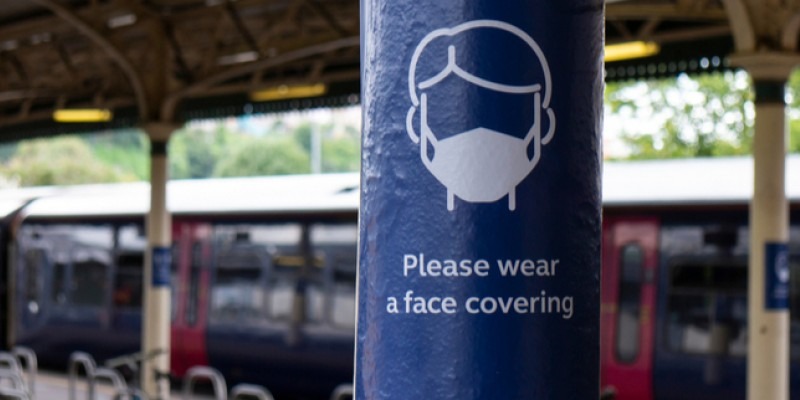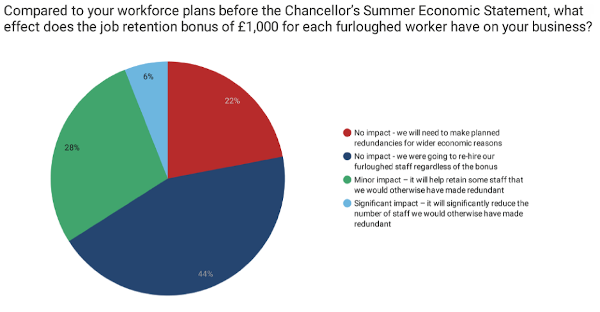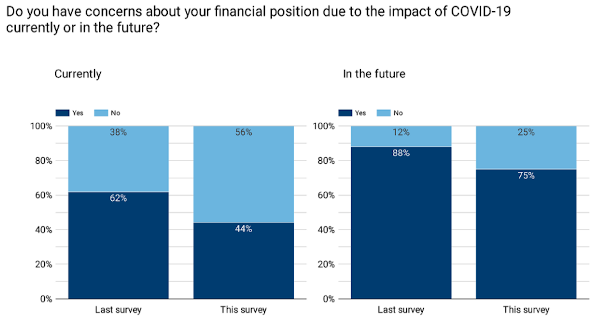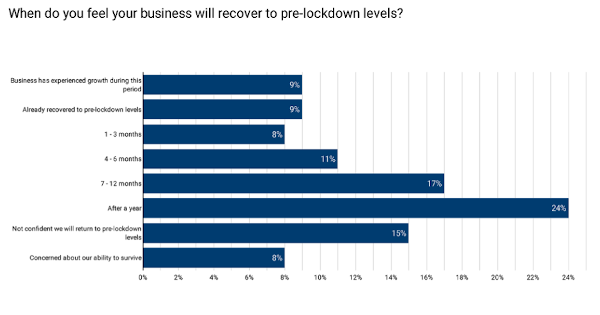
Between 21 July-4 August, Business West conducted its second major survey measuring the impact of COVID-19 on businesses in South West England.
The largest recent survey of its kind, 519 businesses across a wide variety of sizes and sectors responded to highlight the overwhelmingly negative impact of COVID-19, with 76% stating that their experience of the pandemic had been ‘negative’ or ‘extremely negative’ and only 9% describing the impact as being ‘positive’ or ‘extremely positive’.
The survey also sheds significant light on uptake of the Coronavirus Job Retention Scheme (CJRS), present and future job losses, business confidence and likely shape of economic recovery across the region.
CJRS – most popular government intervention, but £1,000 job retention fails to hit the mark with employers
Our survey shows CJRS was the most used government intervention before tax deferrals and Bounce Back Loans. Reflective of this, 41% of businesses described CJRS as essential, whereas 66% described it as either useful, important or essential. Furthermore:
- 38% of businesses used CJRS to furlough three quarters or more of their staff
- 35% of employers didn’t use the scheme at all
- 68% of respondents didn’t expect to make any of their furloughed staff redundant
Despite the value of CJRS to many businesses, however, only 6% of respondents said that the Chancellor’s £1,000 Job Retention Bonus will have a significant impact on whether or not they retain furloughed workers.
Job losses likely to accelerate until November
A significant proportion (20%) of employers indicated that they were unsure of their redundancy plans and 27% have already made difficult decisions in relation to their staff. Of the respondents making redundancies, 65% report this affecting less than a quarter of their workforces. The timing of these redundancies are quite near term:
- nearly half (43%) have already made those posts redundant
- a further 43% will make redundancies between August and October 2020
In addition to redundancies, employers have taken extensive steps to reduce labour costs, with 77% cutting, or planning cuts to paid working hours. Employers have also encouraged or plan to encourage employees to take unpaid leave (37%) or reduce employee salaries (50%).
These statistics show that labour cost reductions go far beyond reported job losses, with take home salaries of workers in our region adversely impacted – a contraction in demand for goods and services is highly likely.
On the flipside, 17% of respondents took on additional staff since lockdown.
Most businesses anticipate a return to pre-pandemic levels of activity next summer
Unsurprisingly 44% of businesses have current concerns about their financial position, rising to 75% in the future. Whilst business sentiment remains very negative, these figures are moderately less gloomy than the 62% and 88% when we asked this same question 4 months ago.
The most dramatic impacts, predictably, were on profitability where 61% of respondents reported a decrease. 50% of respondents reported a decrease in cash reserves. Liabilities including loans had increased for 28% of respondents.The largest group of respondents (24%) anticipate the recovery taking over 12 months. A worrying 15% of respondents don’t anticipate ever recovering to their pre-pandemic level, and the most distressed businesses surveyed (8% of all responses) are concerned about their ability to survive.
Working from home becoming more common, demand for office space changing and carbon emissions reducing
South West businesses say home working is likely to be a key trend in the post COVID-19 ‘new normal’ with 51% of all respondents planning on a greater use of homeworking for at least part of their workforce. 64% were increasing their use of video conferencing to save business travel budgets. The implications of this for employment land and the size of business premises required, however, are less clear:
- 60% of respondents said there would be no change in their business premises requirements as a result of COVID-19
- 17% of respondents anticipate needing less workspace because their staff are working more of their time remotely
- Only 6% of respondents were planning on closing their premises entirely and a wholesale move to remote working
Respondents also expressed an interest in sustainable travel and alternatives to travel as a result of the pandemic and the following trends are noteworthy:
- 54% were focused on increasing uptake of cycling and 39% want to increase uptake of electric bikes and scooters
- 34% were also investing in supporting infrastructure to help securely store bikes and install electric charging points for new zero emission vehicles.
Phil Smith, Managing Director at Business West comments:
“With so much public discourse focussed on the ‘shape’ of the recovery, with ‘U’, ‘V’, ‘L’ and many other letters to choose, this survey offers real insight into how our region is affected by, and recovering from, the most significant economic shock in modern times. Unfortunately for the business health of our region, however, all our results point to a longer-term negative impact of COVID-19.
“The financial health of our region’s business community is vital to our area recovering and thriving, yet COVID-19 impacts cannot be overstated. Our survey shows business confidence has been badly damaged and there is reduced capacity to invest and grow out there. Fresh support is therefore required to restore business confidence and return businesses to growth, attesting the decline of recent months.
“The wider speed at which the economy and individual business income recovers will also be critical to levels of unemployment and underemployment moving forward. Our survey suggests that, other than the devastating personal impact of redundancy, some of the actions taken by businesses will be short term with no longer lasting implications for workers in the region. However, salary cuts, and a move to more use of part-time and home-based working based suggest a longer-term trend. Household purchasing power and confidence has suffered more of a decline than just the jump in the claimant count suggests, significantly hampering the chances of a consumer-led recovery in our region.
“One upside of coronavirus is the potential long-term benefits of homeworking and other behavioural changes on air quality in our region, however, the implications for commercial office space remain unclear.”
You can download the full report here.
- Log in to post comments



